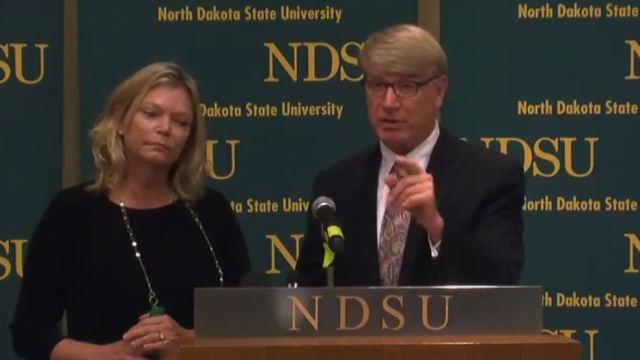Rod St. Aubyn: Should Public Get A Say On Higher Education Evaluations?

I had the chance to visit the legislature during the 3 day Legislative Organizational Session held a week ago. It was a great opportunity to meet many of the newly elected legislators and to reconnect with the returning ones.
While everyone patiently waited to see what their committee assignments were going to be, got training on computers, and participated in many of the other training sessions, there was a relaxed atmosphere which will quickly change with the frantic pace of the upcoming session in early January.
There was some anticipation with what would be in the Governor’s recommended 2015-17 biennial budget, but most thought that it would be a good starting point. Several legislators expressed concern with the continual reduction of oil prices, while others felt that there was plenty of time to see if the reductions are long term or a short-term issue.
One issue that came up often was the ongoing issues within higher education. It seems that every day a new story is reported about some controversy within higher educations. Whether it is open meeting/open record violations, terminated employees, employees being placed on leave, or a President’s driver/bodyguard it seems to make the news daily.
[mks_pullquote align=”right” width=”300″ size=”24″ bg_color=”#000000″ txt_color=”#ffffff”]”I was surprised by the comments from several legislators expressing almost exasperation with what has been reported in the newspapers. Several of these legislators are ones who have historically been considered “friends of higher ed.”[/mks_pullquote]
I was surprised by the comments from several legislators expressing almost exasperation with what has been reported in the newspapers. Several of these legislators are ones who have historically been considered “friends of higher ed.”
Based on these comments, I would expect that higher education appropriations will be scrutinized more thoroughly this upcoming session. In addition, based on what I had heard from several Republican Senators, I don’t think the upcoming confirmation hearings for 4 newly or future appointed commissioners of the Board of Higher Education will be slam dunks.
They can expect a lot of intense questioning.
I had an interesting conversation with several legislators on the topic of the proposal (though supposedly since scrapped proposal) of exempting the President’s evaluations from the open records laws. I mentioned the “360 evaluations” and the possible complications of not exempting those comments from the ultimate President’s evaluation. I am a strong believer in gathering comments and opinions of top leaders from sources all around these leaders.
I was somewhat conflicted with the issue of confidentiality of these comments. On one hand, knowing that their comments will become public will these people be reluctant to offer their candid opinions for fear of retaliation? Instead would they basically offer somewhat mild support for the campus leader because they don’t want to be held back or held accountable for constructive criticism?
On the flip side, if these comments were held confidential would we be creating an environment where someone could falsely accuse a leader for unfounded criticisms? Doesn’t a President or other higher education leader have the right to know what they are being accused of doing and by whom? Even if it is “constructive criticism”?
After my discussions and after putting a little thought into the issue, I think I came up with a workable solution. All evaluations must continue to be kept open to the public. After all, it is the public that is paying the salaries of these individuals. One part of that evaluation would include a “360 survey”.
I would propose that the Board of Higher Education adopt a process/policy where ALL top higher education officials (Chancellor, Presidents, and possibly Vice-Chancellors, top campus Vice Presidents or other top campus leaders in the future) have a confidential survey completed by key constituencies to evaluate their performance. The constituencies could and most likely would vary based on the position.
For example, a campus president has many different constituencies that he/she must be accountable to – campus employees, students, community leaders, alumni, faculty, legislators, Higher Education Board Members, Chancellor’s office, etc. The survey could randomly select people from each constituency to be selected. The Board could define the general parameters and possible constituencies.
Though the surveyed individual’s name could be kept confidential, the final results would be public. These surveys would only be one component of an evaluation, but could assist the Board, the Chancellor, and/or the President in preparing his/her evaluation of the leader and also would be helpful in determining if further investigation would be necessary of the individual being evaluated.
I would suggest that this be started with just a core group of key higher educational leaders (Chancellor and campus presidents). If it proves to be valuable, the process could be expanded to other higher educational leaders. I fully recognize that the “devil is in the details” on this proposal. The key would be defining questions for the survey. All of that is manageable. In addition, there is a cost for doing such surveys. However, I feel that with what we are investing in higher education it is important that we get clear indications how our leaders are performing their required responsibilities. It is money well spent. We should not be wasting taxpayer dollars for leaders that are not performing as they should be.
Responsible leaders would welcome the input and take the results as “challenges to further their growth”. I would further suggest that the Board of Higher Education should also implement a public evaluation of their performance. Hopefully that would be beneficial in advising them if the public supports their actions. I feel that something like this needs to be done to garner the public’s support for higher education after the many negative news stories of late.




